By KATIE EUBANKS
Christ Life Church of the Highlands —
A church that looks like ‘the heart of God’
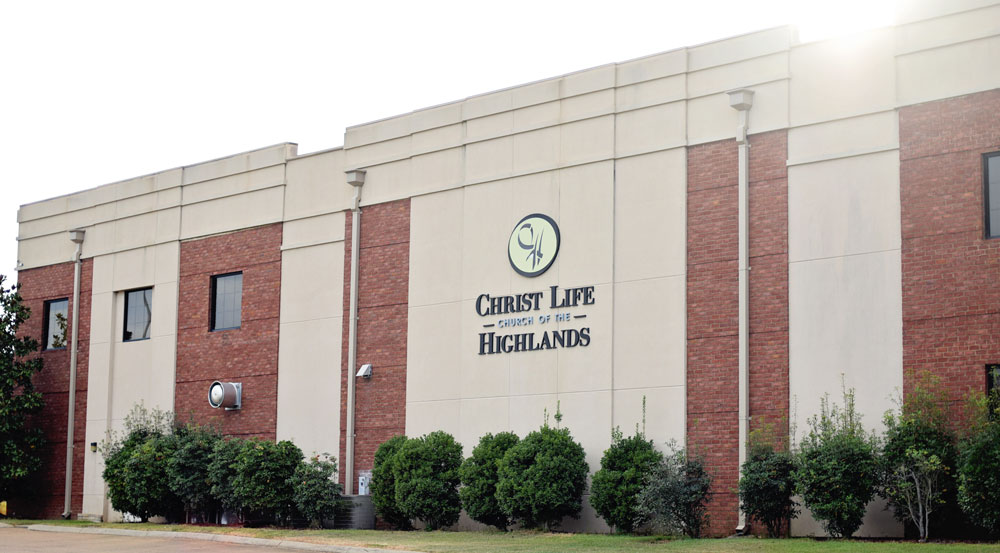
The day after deciding to move to Jackson, the Hales passed by this building as it was being constructed. “They’re building that for us,” Nita said.
Nita Hale’s father worked in military intelligence, so the family moved around a lot. Despite her Louisiana roots, she learned to adapt to new places — or get run over. She also learned to stand up for others.
“I found myself championing people’s causes when they were being bullied,” she says. “I’ve always been a person of justice and the principle of the thing.”
Meanwhile, her future husband, David, grew up in Illinois and went to school in Minnesota. Later, after he and Nita married, he worked at a shipyard in south Louisiana while leading a church in the area.
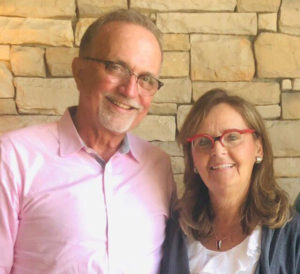
Senior Pastors David and Nita Hale of Christ Life Church of the Highlands.
“I was leaving work one day, and I ran after this (black) guy and said, ‘Hey boy, what are you doing?’” David recalls, “and he put his arm around me and said, ‘I just saved you from getting hit.’”
David had no idea that, to a black man, being called “boy” is almost as bad as being called something else. In the Jim Crow South, white people often called black men “boy” regardless of age. No “sir,” no “mister,” not even a first name. Just “boy.”
So David’s coworker gave him an education. But the Lord gave him a vision, he says.
In 2003, David and Nita — two “champions of causes,” Nita says — met with a group of 17 people and told them they wanted to plant a church in Jackson. They were living in Alexandria, Louisiana, at the time.
David laid out a handful of “musts” for this church-planting venture, including “a diversity of representation,” he says.
But he doesn’t like it when people talk about the “what” and not the “why.” So, why should a church go out of its way to welcome people of all colors and treat them as equals?
“I believe it’s at the heart of God,” he says.
“I think one of the major problems in Christian churches today is that we’re not free from racial issues. It’s not necessarily hatred, but not being able to do something about it.
“Mississippi is the most generous state … But, it’s like when He wrote to the church at Ephesus (in the book of Revelation), ‘I have this one thing (against you) …’ I felt like if (racial healing) would be Nita’s and my calling, God would honor that.”
Despite their desire to plant a racially inclusive church, Nita wasn’t too excited about moving to Mississippi at first. They’d also considered Las Vegas, which surely had a better mission field, right?
“(I said) ‘They’ve probably got a church on every street corner (in Jackson). Let’s go somewhere where there aren’t any churches,’” she recalls. So she asked God for a sign to assure her that she and David were doing His will.
One day they were driving by a construction site in Ridgeland. The frame of a church building was going up on Highland Colony Parkway, visible from I-55.
Nita pointed and said, “They’re building that for us.”
Beg pardon?
“God just gives me things, and I just know it. I don’t have any proof,” she says now.
Well, fair enough. Christ Life Church of the Highlands is in that building now, though it wasn’t their first meeting place.
They held their first service at someone’s house. Those 17 people who’d met with the Hales told other people who might be interested, and about 30 showed up. Later they met at St. Joseph Catholic School in Madison, and finally at their current location. It had been built for them after all.
A RESTAURATEUR AND PASTOR
If you look at Christ Life’s website under “Meet the Team,” you’ll find a mix of white and non-white people pictured in leadership roles at the Ridgeland campus (they also have a River Campus in Vidalia, Louisiana).
And if you attend a Sunday service at Christ Life (at 9 or 10:45 a.m.), chances are you’ll see a mix of white and non-white people leading worship.
These things don’t just happen.
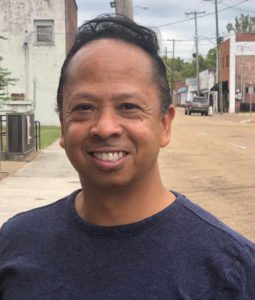
Geno Lee, children’s pastor at Christ Life Church of the Highlands.
For instance, after Geno Lee and his wife visited Christ Life for the first time, David visited Geno at his family-owned restaurant, Jackson mainstay Big Apple Inn — that very week.
“I think we kind of blew his mind. I just felt very, very strongly that he was going to be key to a lot of things,” David says.
The son of a Freedom Rider, Geno is a sort of human melting pot, with Mexican, black and Asian heritage. During the civil rights movement, Medgar Evers held meetings at the restaurant.
Geno says it was Christ Life’s friendliness that first impressed him. Then, thinking back over the service, he and his wife realized how diverse the congregation was.
Another good sign: “You know when you’re in the minority at a church, like if you’re a black person at a white church or a white person at a black church, and everybody’s in line to make you feel welcome, and they almost make you feel too welcome, almost like it’s a wedding party? It wasn’t like that.”
All the same, when David came to see him, Geno said he was happy to merely attend Christ Life. “(I said) we just want to sit in the back pew like a good Christian. And he actually told me no.”
So Geno became the children’s pastor.
INTENTIONALITY, CONVERSATIONS AND FREEDOM
Nita notes that she makes sure “at every door there is diversity (on our greeter team).”
“I didn’t know you did that,” David says, and then upon reflection adds, “I think sometimes whites will gather at one door, because they see each other more (elsewhere), and blacks at another, and we break that up.”
Another crucial component in making a diverse church work? Talking to each other.
“I don’t have a problem asking questions of Art (LIFE Pastor Art Jones) or Geno or whoever, and vice versa,” Nita says.
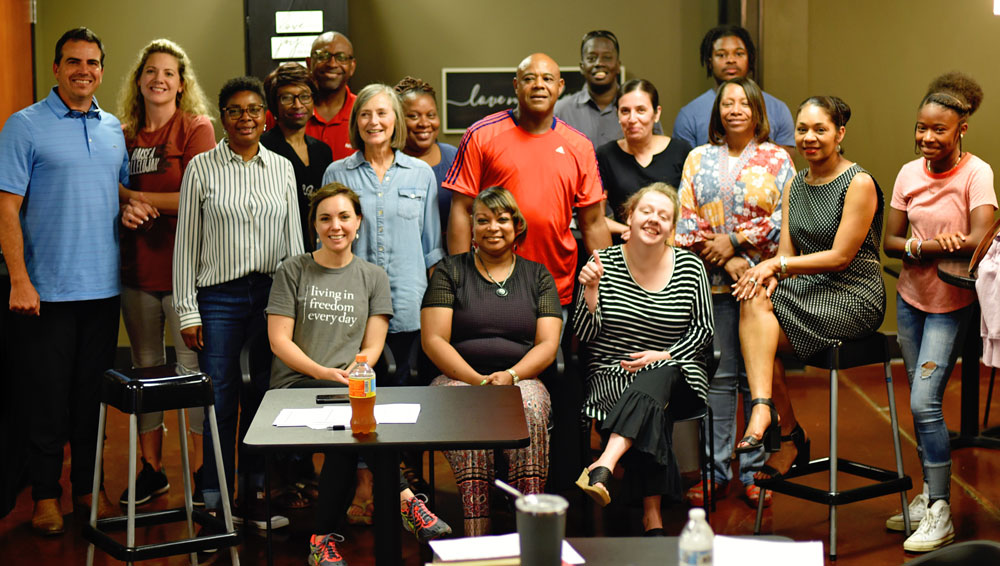
An evangelism class at Christ Life Church of the Highlands.
“All the time,” Geno adds.
“We’re always learning from each other,” Nita says.
Twice a month, early on a Sunday before any of the services start, Christ Life holds a leadership intensive for their staff and other leaders. They often talk about “cultural protections,” David says. And while they don’t always discuss diversity, “the culture in there helps.”
And of course, there are the inevitable corrections.
“One of the young white girls in our youth group was braiding her hair and was trying to act like a black girl,” Nita says. “And one day I said, ‘Stop. You are white. You’re never going to be black. Our job is not to change each other but to be who we are and live together.’ And she did quit it.”

A gaggle of girls at Christ Life Church of the Highlands.
David believes if someone from up North came to Christ Life and made the kind of mistake he made years ago — calling a black man “boy” or saying something else insensitive — “there’s grace here. Someone could correct them graciously.”
He also points out the church’s Connect Groups, where members find spiritual freedom.
“I think we got here because we had a God-given vision to see people set free — from a lot of things, but (racial tension) is one of them,” he says.
“Once people find freedom, they have freedom from everything. Of course, nobody’s going to say they’re a racist…”
“A lot of people don’t realize they need freedom from racism,” Geno notes.
TURNOVER AND RETURN VISITORS
Geno says he can’t think of another local church that has the same level of racial diversity as Christ Life.
And that racial diversity has created generational diversity, he says.
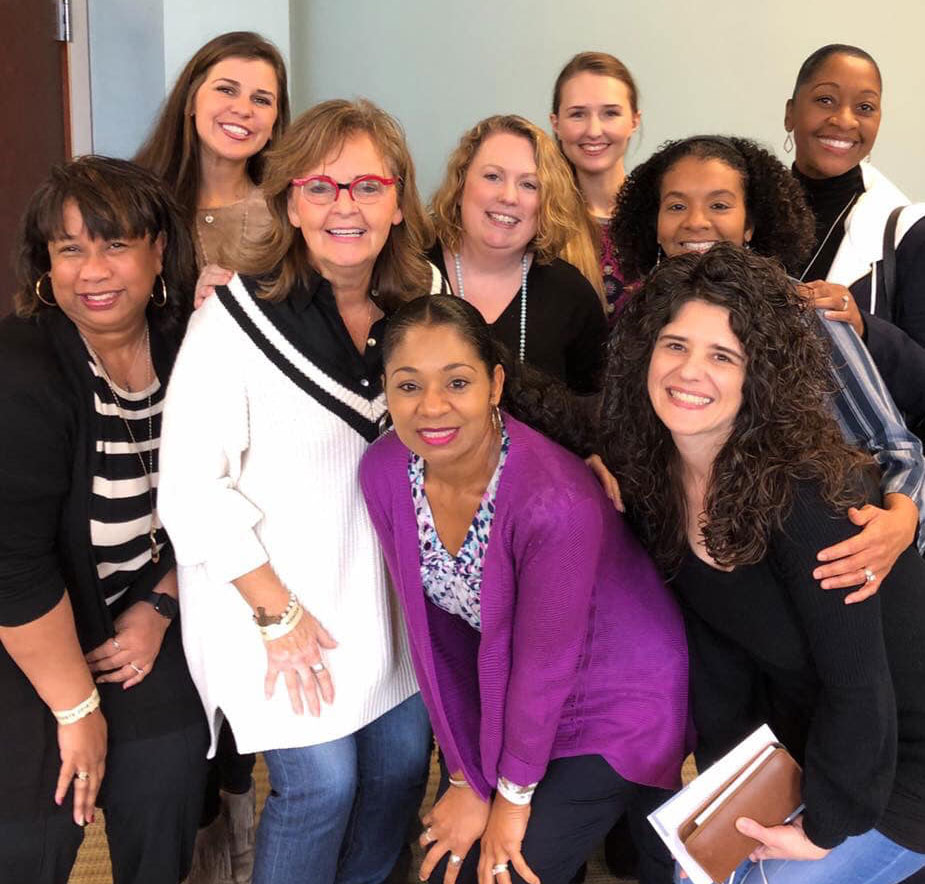
Ladies of Christ Life Church of the Highlands. Back row, from left: Jordan Higgins, Samantha Hamlin, Constance Houston. Middle row, from left: Marilyn Smith, Senior Pastor Nita Hale, Leslie Key, Rosiland Jones. Front, from left: Sandra Hilliard, Joèl Povolni.
“We’ve had a huge influx of under-30 (people), because (racial diversity) is what they want. This is what they’re used to at their college campuses, at their high schools … it’s not their mom and dad’s church.”
For similar reasons, Christ Life attracts a lot of interracial couples.
There is also diversity economically, David says. “We believe everyone needs God, and without Him, nothing in our life looks the way it’s supposed to. We’re not just going to try to reach down-and-outers. There are also up-and-outers. I used to ride with the police out in one of the finest subdivisions (in the area).”
About 525 people attended services on a recent Sunday, David says.
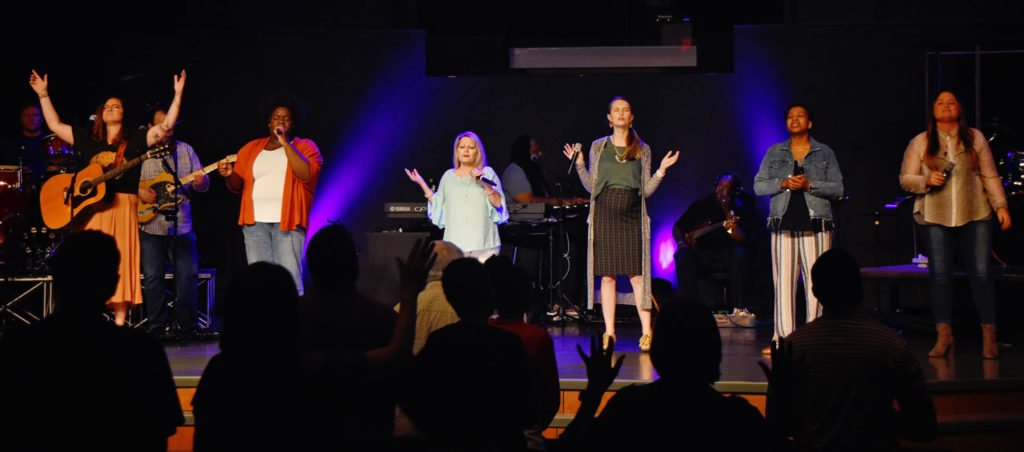
If you attend a Sunday service at Christ Life, you’ll probably see a mix of races onstage.
The diversity does make people uncomfortable. “Sometimes we have people who think they want diversity, but when they get here, they realize, ‘Maybe I’m not as ready as I thought,’” Geno says.
“I think we have a slightly higher turnover rate because of that,” David says.
In the meantime, Christ Life will keep doing what they do. Some folks will come and stay, others will visit a few times and leave. “(Racial healing) won’t happen in a generation or two,” David says.
“But then some people who leave, later on, they always keep coming back,” Geno says.
And it’s not primarily because of Christ Life Church itself, but the God they serve.
“We have very little to do with this. What God blesses is when we position and prepare ourselves for what He wants to do. That needs a star by it,” David says.
Duly noted.

